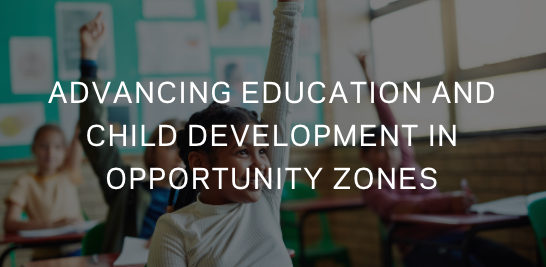Children in nine out of 10 Opportunity Zones lack adequate access to high-quality early childcare and schools, safe places to live and play, and economic opportunity.
Washington, D.C. – Today, the Economic Innovation Group (EIG), with support from the Chan Zuckerberg Initiative, released a first-of-its-kind report on the environmental factors that limit upward mobility for low-income children, and how the Opportunity Zones policy can be leveraged to advance education and child development in some of the nation’s most distressed communities.
The consequences of our nation’s deep social and economic divisions are most evident in communities where millions of children are isolated in pockets of poverty due to decades of divestment. For too long, low-income children have struggled to realize their full potential due to the condition of their neighborhoods. Many distressed communities, including the vast majority of Opportunity Zones, lack adequate access to high-quality early childcare and schools, safe places for children to live and play, and economic opportunity. Such conditions can dramatically impair a child’s academic success, lifetime earning potential, and health outcomes.
The COVID-19 pandemic has disproportionately affected distressed communities and highlighted inequities in access to the internet and affordable childcare. Twenty-two percent of the 7.5 million children living in Opportunity Zones may not have been able to participate in remote learning as they do not have a computer with internet at home. As schools and childcare centers were forced to close, working parents struggled to find affordable alternatives for childcare. Forty percent of children in Opportunity Zones live in a single-parent household. As schools remain closed and childcare options limited, family incomes may be reduced as single parents face impossible decisions about limiting their work hours or leaving the workforce all together.
Policymakers and local leaders seeking innovative solutions to address the needs of these families can activate Opportunity Zones to attract private investment in over 8,700 low-income census tracts across the nation. Advancing education and child development in Opportunity Zones illustrates how the policy can be used to drive financing to schools, childcare centers, and businesses dedicated to improving child outcomes.
“All students deserve an education that equips them with the skills and abilities they need to reach their full potential,” said Brooke Stafford-Brizard, Vice President of Research to Practice at Chan Zuckerberg Initiative. “We believe transformational efforts require deep, long term partnerships with communities and families. We were excited to support EIG’s report, which elevates the potential that Opportunity Zones hold for focusing resources where they are needed most.”
EIG’s report explores various Opportunity Zones strategies that public and private sector leaders can use to support schools, childcare centers, and businesses focused on improving life outcomes for children. For example:
- Investors can align with government leaders to identity high-impact projects and businesses in need of equity financing;
- Businesses that support child development can move to an Opportunity Zone, which may enhance their efforts to raise seed and growth capital;
- Local employers, universities, community organizations, and similar anchor institutions can invest in Opportunity Zones deals; and
- Funders can support community efforts to implement Opportunity Zones strategies.
“Investing in quality education and childcare is a vital part of creating a stronger, more dynamic economy and strengthening our national resiliency,” said EIG President and CEO John Lettieri. “The pandemic recovery will require an all-hands-on-deck approach, and Opportunity Zones can be deployed as an innovative tool to spur investments that positively shape our children’s futures.”
The report is accompanied by the newly released, Strategies for hosting an Opportunity Zones convening, which provides a blueprint for public and private sector leaders inspired to coalesce a larger group of stakeholders and implement strategies outlined in the report.
EIG media contact: Cal Harris ([email protected])
About the Economic Innovation Group (EIG)
The Economic Innovation Group (EIG) is an ideas laboratory and advocacy organization whose mission is to advance solutions that empower entrepreneurs and investors to forge a more dynamic American economy. Headquartered in Washington, D.C. and led by an experienced, bipartisan team, EIG convenes leading experts from the public and private sectors, develops original policy research, and works to advance creative legislative proposals that will bring new jobs, investment, and economic growth to communities across the nation. For more information, visit eig.org.
###





